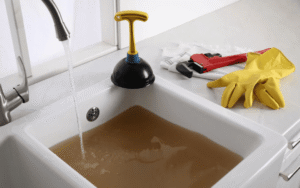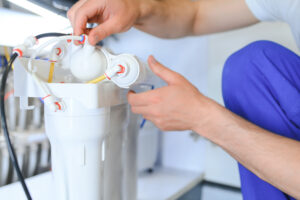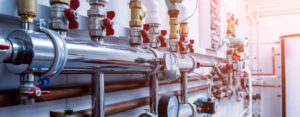There are few things worse than stepping into the shower expecting warmth, only to be hit with a blast of icy water. But most hot water systems don’t just quit out of nowhere. They usually drop a few hints that they need a bit of attention first.
Whether it’s odd noises, strange smells, or your hot water running out faster than usual, spotting the signs early can save you from those shivering morning surprises (and a big repair bill). So, let’s chat about the red flags to watch for and what to do if you spot them.
Your hot water isn’t as hot as it used to be
If you’re finding the shower temperature has gone from “ah, perfect” to “eh, lukewarm,” it’s a sign your hot water system might be struggling. This is especially true if you’ve cranked the thermostat and it’s still not doing the job.
What could be going on:
- Sediment build-up: Over time, minerals from hard water can settle at the bottom of your tank, acting like a blanket between the heating element and the water. This build-up can make it harder for the element to heat the water efficiently, leading to cooler showers.
- Faulty thermostat: If the thermostat’s on the blink, it might not be heating water to the right temperature. In some cases, the thermostat might be set too low without you realising.
- Aging elements: Electric systems have heating elements that can wear out with age, reducing the overall efficiency of your hot water system.
What to do:
Try flushing the tank to get rid of sediment build-up. If that doesn’t help, it might be time to call in a professional for a closer look.
Check the thermostat setting and consider turning it up a notch, just make sure it’s not set above 60°C to avoid scalding.
Hot water runs out fast
If you’re running out of hot water halfway through your shower, or worse, before you’ve even rinsed off the shampoo, it’s usually a sign that your system’s not heating or storing enough water.
What could be causing it:
- Sediment build-up: Again, it’s a big culprit. When it takes up space in your tank, there’s less room for hot water. In some cases, sediment can also insulate the water from the heating element, making it take longer to heat up.
- Burnt-out elements: For electric systems, a burnt-out element means only half your water’s getting heated, which can cause it to run out faster.
- Old age: If your system’s pushing 10–15 years, it might just be past its prime and unable to keep up with your household’s hot water demands.
If your system’s on the older side, upgrading to a bigger tank or a continuous flow system could solve the problem for good.
Is your hot water running out too quickly?
Do you find yourself rushing through showers because the hot water runs out too soon? If it doesn’t even last long enough to rinse your hair, chances are your water heating system isn’t performing as it should.
Here’s what might be happening:
- Tank too small for your needs: Sometimes, it’s not a technical issue but a matter of capacity. A small tank may struggle to keep up with the demands of a large household.
- Slow reheating time: Older systems can take a long time to reheat water after extended use. That means the first few people in the shower get hot water, while the rest are left in the cold.
- Heat loss through poor insulation: If your tank or pipes have damaged insulation, heat can escape more quickly than it can be replaced, causing water to cool down prematurely.
- Increased usage over time: Your household habits might have changed, more people, longer showers, and your current system might no longer be up to the task.
What can you do?
That’s when Flowtec can help you with a full maintenance check to rule out heat loss or faulty components. If your household has grown or your habits have changed, it might be time to upgrade to a higher-capacity system or a continuous flow unit that ensures uninterrupted hot water.
Strange noises: Banging, popping, or rumbling
Hot water systems shouldn’t sound like they’re auditioning for a horror movie. If yours is making popping, banging, or rumbling noises, it’s not just being dramatic, it’s trying to tell you something.
What it usually means:
- Sediment build-up (again): Heated water can make sediment at the bottom of the tank harden, causing popping or rumbling sounds as it heats up. In gas systems, this build-up can also cause overheating, which isn’t great for your tank’s lifespan.
- Air pockets: Trapped air can cause banging or knocking sounds as it tries to escape through the pipes.
- Water hammer: A sudden bang when you turn off a tap can mean high water pressure or unsecured pipes. Water hammer arrestors can usually sort this out quickly.
What to try:
Flush the tank to deal with sediment build-up.
Install water hammer arrestors if you’re dealing with banging pipes.
Rust-coloured water
If the hot water coming out of your taps has a rusty tint, it’s usually a sign of corrosion inside your tank or pipes. While a bit of sediment can cause discolouration, actual rust means it’s time to act fast.
What might be causing it:
- Corroded anode rod: The anode rod’s job is to attract minerals that cause rust. If it’s worn out, your tank will start to rust instead.
- Old tank: If your system’s past the 10-year mark, rust can be a sign it’s on its way out. In some cases, replacing the anode rod can buy you a bit more time.
Fill a few buckets from different taps. If only the hot water is rusty, it’s likely your tank that’s the problem—not your pipes.
Leaks or puddles around the tank
A bit of condensation on the outside of your tank is normal, especially in winter. But actual puddles or drips? That’s a different story. Even small leaks can turn into big problems if they’re not sorted quickly.
Common causes:
- Loose connections: Check the pipes and valves for any obvious drips.
- Cracks in the tank: Unfortunately, if the tank itself is leaking, it’s usually game over.
- Pressure build-up: A faulty pressure relief valve can cause leaks or even make your tank burst.
What to do:
- Tighten any loose connections.
- Switch off the power and water to the tank if you spot a crack or a major leak and call a professional.
It’s been over a decade since you replaced it
Hot water systems aren’t built to last forever. Most have a lifespan of around 8-12 years, so if yours is getting on in years, it might be time to start thinking about a replacement before it gives up completely.
Signs it’s time to upgrade:
- Frequent repairs are costing more than the system’s worth.
- Rising energy bills, even though your usage hasn’t changed.
- You’ve had it for over 12 years, and it’s showing signs of rust, leaks, or efficiency drop-offs.
Why not to wait:
Upgrading before your system fails means you can take the time to choose the right replacement instead of scrambling for a quick fix when you’re stuck with cold showers.
Don’t ignore the signs
Hot water systems rarely break down out of nowhere; they usually give you a few warning signs first. Paying attention to things like water temperature, odd noises, or even the age of your system can save you from cold showers and a costly emergency replacement.If you’re spotting any of these signs, it’s better to deal with them sooner rather than later. A simple fix now could save you from needing a whole new system down the track.
Need some help with your hot water system?
If you’ve noticed any of these warning signs, it might be time for a check-up. Call Flowtec, conveniently located near you in Adelaide, at 0488 097 697 or book a service online. We can help you identify the issue and get your system running like new in no time.



